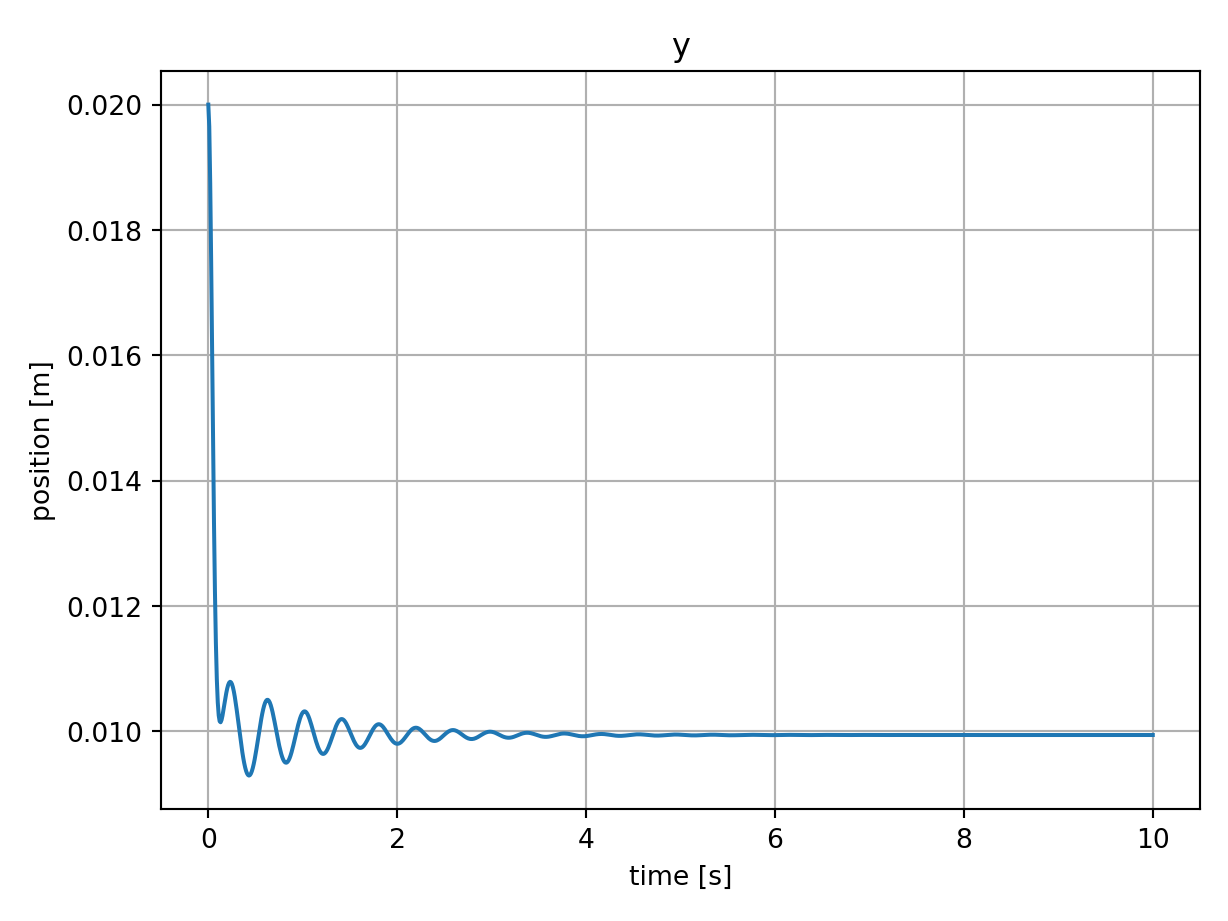Automatic Control Knowledge Repository
You currently have javascript disabled. Some features will be unavailable. Please consider enabling javascript.Details for: "controller design via full state feedback"
Name: controller design via full state feedback
(Key: ZPPRG)
Path: ackrep_data/problem_solutions/full_state_feedback View on GitHub
Type: problem_solution
Short Description:
Created: 2020-12-30
Compatible Environment: default_conda_environment (Key: CDAMA)
Source Code [ / ] solution.py
Solved Problems: equilibrium change of a nonlinear resistor | design of a full state feedback controller to control the x-position of the load to 1.5m | design of a full state feedback controller to control position of the both balls |
Used Methods: system proporty full_state_feedback_controller
Result: Success.
Last Build: Checkout CI Build
Runtime: 3.6 (estimated: 10s)
Plot:

The image of the latest CI job is not available. This is a fallback image.
Path: ackrep_data/problem_solutions/full_state_feedback View on GitHub
Type: problem_solution
Short Description:
Created: 2020-12-30
Compatible Environment: default_conda_environment (Key: CDAMA)
Source Code [ / ] solution.py
#!/usr/bin/env python3
# -*- coding: utf-8 -*-
"""
problem solution for control problem: design a controller by using full state feedback.
"""
try:
import method_full_state_feedback as ftf # noqa
import method_system_property as msp # noqa
except ImportError:
from method_packages.method_full_state_feedback import method_full_state_feedback as ftf
from method_packages.method_system_property import method_system_property as msp
import symbtools as st
from scipy.integrate import odeint
import sympy as sp
import matplotlib.pyplot as plt
import os
from ackrep_core.system_model_management import save_plot_in_dir
class SolutionData:
pass
def rhs_for_simulation(f, g, xx, controller_func):
"""
# calculate right hand side equation for simulation of the nonlinear system
:param f: vector field
:param g: input matrix
:param xx: states of the system
:param controller_func: input equation (trajectory)
:return: rhs: equation that is solved
"""
# call the class 'SimulationModel' to build the
# 'right hand side'equation for ode
sim_mod = st.SimulationModel(f, g, xx)
rhs_eq = sim_mod.create_simfunction(controller_function=controller_func)
return rhs_eq
def solve(problem_spec):
"""solution of full state feedback
:param problem_spec: ProblemSpecification object
:return: solution_data: states and output values of the stabilized system, and controller gain
"""
sys_f_body = msp.System_Property() # instance of the class System_Property
sys_f_body.sys_state = problem_spec.xx # state of the system
sys_f_body.tau = problem_spec.u # inputs of the system
# original nonlinear system functions
sys_f_body.n_state_func = problem_spec.rhs()
# original output functions
sys_f_body.n_out_func = problem_spec.output_func()
sys_f_body.eqlbr = problem_spec.eqrt # equilibrium point
# linearize nonlinear system around the chosen equilibrium point
sys_f_body.sys_linerazition()
tuple_system = (sys_f_body.aa, sys_f_body.bb, sys_f_body.cc, sys_f_body.dd) # system tuple
# calculate controller function
# sfb for dataclass StateFeedbackResult
sfb = ftf.state_feedback(
tuple_system, problem_spec.poles_cl, problem_spec.xx, problem_spec.eqrt, problem_spec.yr, debug=False
)
# simulation original nonlinear system with controller
f = sys_f_body.n_state_func.subs(st.zip0(sys_f_body.tau)) # x_dot = f(x) + g(x) * u
g = sys_f_body.n_state_func.jacobian(sys_f_body.tau)
rhs = rhs_for_simulation(f, g, problem_spec.xx, sfb.input_func)
res = odeint(rhs, problem_spec.xx0, problem_spec.tt)
output_function = sp.lambdify(problem_spec.xx, sys_f_body.n_out_func, modules="numpy")
yy = output_function(*res.T)
solution_data = SolutionData()
solution_data.res = res # states of system
solution_data.pre_filter = sfb.pre_filter # pre-filter
solution_data.ff = sfb.state_feedback # controller gain
solution_data.input_fun = sfb.input_func # controller function
solution_data.yy = yy[0][0] # system output
save_plot(problem_spec, solution_data)
return solution_data
def save_plot(problem_spec, solution_data):
# plotting of the system states
titles1 = problem_spec.titles_state
plt.figure(1)
for i in range(len(titles1)):
plt.subplot(problem_spec.row_number, int(len(titles1) / problem_spec.row_number), i + 1)
plt.plot(problem_spec.tt, solution_data.res[:, i], color=problem_spec.graph_color, linewidth=1)
plt.grid(1)
plt.title(titles1[i])
plt.xlabel(problem_spec.x_label)
plt.ylabel(problem_spec.y_label_state[i])
plt.tight_layout()
titles2 = problem_spec.titles_output
plt.figure(2)
for i in range(len(titles2)):
plt.plot(problem_spec.tt, solution_data.yy)
plt.grid(1)
plt.title(titles2[i])
plt.xlabel(problem_spec.x_label)
plt.ylabel(problem_spec.y_label_output[i])
plt.tight_layout()
# save image
save_plot_in_dir()
Solved Problems: equilibrium change of a nonlinear resistor | design of a full state feedback controller to control the x-position of the load to 1.5m | design of a full state feedback controller to control position of the both balls |
Used Methods: system proporty full_state_feedback_controller
Result: Success.
Last Build: Checkout CI Build
Runtime: 3.6 (estimated: 10s)
Plot:

The image of the latest CI job is not available. This is a fallback image.